WASHINGTON, DC
September 13, 2019
STRANGER: Jesse Rifkin
LOCATION: Mr. Smith’s of Georgetown, 3205 K Street NW, Washington, DC
THEME: Meeting the resident pianist at a popular DC piano bar
It’s nine o’clock on a Friday, a crowd of regulars and newcomers shuffle in to Mr. Smith’s of Georgetown to hear resident pianist Jesse Rifkin play. Someone might think they’re being original and witty by asking him to perform Billy Joel’s “Piano Man,” but odds are he’s had the request several times. When I visit the bar to interview Jesse, he lets me pick his opening number but implores me against choosing that song.
One of his “least favorite things” is when he’s just played “Piano Man” or another over-requested song and a few minutes later some new customers walk in and request the same song without realizing Jesse just performed it. “Sometimes I tell them I just played it, but if it’s more than three songs later I’ll just internally sigh and play it.”
Jesse, 27, has been playing Friday and Saturday nights at the bar since March 2018. He takes requests from a song sheet he made that covers the 1920s through today, but he’ll also plays tunes not on the list. While he takes the lead on singing, customers are invited to join in whenever they feel like it. If he doesn’t know a number, he promises to learn it and perform it for the customer if they come back next week. In addition to being a nice gesture, he says, “It’s a marketing strategy to get people to come back.”
His favorite music is jazz, but no-one requests that when in a raucous room of revelers because there are usually no lyrics, so there’s no singing along. Instead, he’s used to playing number one songs from major artists including Adele, Bob Dylan, the Beatles, Elton John, and others for an audience that can be star-studded.
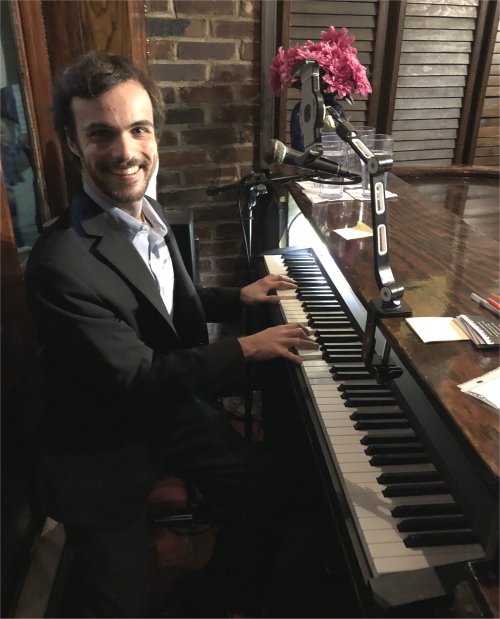
Local magazine Washingtonian recently ran an article about the time soccer star Wayne Rooney pulled up a stool by Jesse’s piano and requested “Folsom Prison Blues” by Johnny Cash. And other celebrities who’ve visited Mr. Smith’s include Ringo Starr and Lady Gaga.
Not that level-headed Jesse would get too starstruck; on the night I visit he’s focused on making sure everything goes just right. He makes sure his instrument (a high-end electric keyboard housed in a wooden bar shaped like a grand piano) is working, doles out the song sheets to customers, and sips on cranberry juice to lubricate his throat. He enjoys playing piano, but also takes this gig as seriously as any other job.
It generates a host of memorable moments; he shares the story of a just-married couple who had tied the knot at City Hall and had him perform “To Make You Feel My Love” as their first dance. And there’s the regular who occasionally drops by with his saxophone to perform with Jesse. These stand-alone highlights all blend into a broader view Jesse has of using the nights to bring some joy to people’s lives. “One of the best things about doing this is seeing people be happy,” he says. “It’s Friday, work sucks, a lot of people are really afraid right now. To know that you’re bringing the best or only good moment of peoples’ week is really satisfying. It’s giving people happiness.”
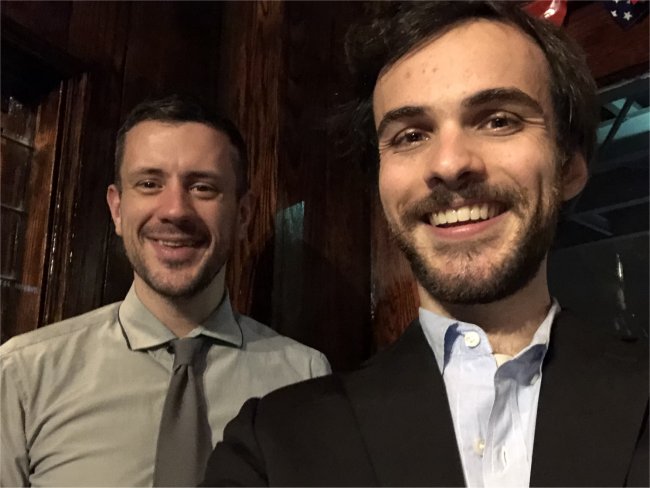
On the night we meet, Jesse is high energy, amped up by the fact he’s about to perform and also eager to share his story during our pre-show dinner.
He speaks in a confident, engaging way, often punctuating his sentences with funny asides and a broad, warm smile. And even though I’m doing the interviewing, he’s one of the best listeners I’ve met — something I quip at the start of the meal comes back two hours later at the end when he mentions it. That attention to detail runs through both his professional and private life, behind the piano and elsewhere.
Largely self-taught, Jesse first started playing piano when he was about five years old on an electric keyboard. He would listen to records his dad played or top 40 hits on the radio and strike the keys trying to figure out how to replicate the sound. “My parents got me lessons for a few months when they saw my talent developing, but eventually I felt like I could figure it out on my own,” he says.
Lacking a formal piano education means he isn’t able to read sheet music well, and can’t play every song in every key. But over the years he’s still mastered the melodies to more than 1,000 songs, and uses a tablet for the accompanying lyrics.
“It took me hours and hours to figure out what I key I sing songs best in, I have every song in my song sheet bookmarked, telling me what key is best,” he says.
A project that helped with learning about decades of music is something else he credits with developing such a deep knowledge of pop songs. In April 2011, the Washington Post ran a piece he wrote about a quest to listen to every number one on the Billboard Hot 100 chart since it launched in 1958 in the United States. It was inspired by a headline he saw in Billboard Magazine that said the chart was about to notch its 1000th song. “I looked at the list of songs and realized I hadn’t heard most of them,” he tells me. “So I decided to listen to about 10 songs a day till I caught up.”
Not only did it help him learn a host of songs to play on the piano, but he also says he discovered some things about the evolution of music — including the shift from bands in the 1950s and 1960s to a focus on the solo artist present day. “I wonder if John and Paul and George and Ringo met now would they have tried to start the Beatles?”
That inspires me to pick “Ob La Di” as the opening number for Jesse’s set, and later that night he’ll perform it with gusto. But first I want to know all about his past.
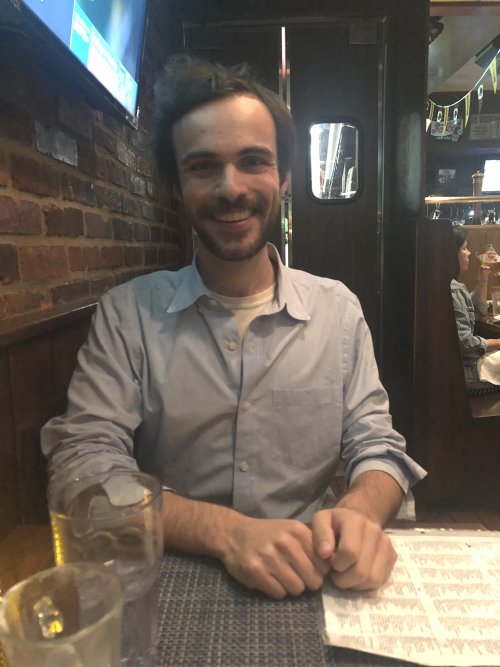
Even though Jesse plays piano twice a week, “I’m primarily a journalist” he confides.
Born and raised in Connecticut, he went to the University of Connecticut to pursue a degree in journalism. “I loved writing, telling stories, profiling interesting people and opinion columns,” he says. One year at college he won a national award for best opinion columnist and tells me that reassured him of his career path.
In his eight and final semester Jesse did an internship at The Ellen DeGeneres Show in Los Angeles for several months, and although he wasn’t hired permanently at the end of it he debated settling down in the City of Angels. Later, Huffpost Politics offered him a six-month reporting trial in DC. He reasoned that he’d either get hired and stay in the District, or move back to LA if the trial ended without a job.
Flashing a smile, Jesse says, “What I did not entertain was option three: I stayed in DC due to a combination of things including the piano bar, my younger brother ended up moving here,” and picking up another weekly gig elsewhere hosting trivia.
He settled permanently in Washington in January 2015. In addition to being paid for his piano playing, Jesse has two steady gigs that pay the bills: writing legislative summaries for GovTrack Insider, and doing interviews with directors and screenwriters for the movie industry magazine BoxOffice. He also writes occasional articles for Northern Virginia magazine profiling interesting people living in the area.
“As long as my brother lives down here, I’m here,” he says.
“A Step in the Write Direction” stems from an idea he had to contact notable authors to ask them to share a piece of writing they did before they were famous. It could be anything from a story written in school to an early newspaper article. He finds authors on Twitter, their personal websites, or elsewhere online, and cold messages them to take part. Although he confesses to having a spreadsheet of the many people who’ve never even replied, several major writers have written back and shared.
“Sunday Magazine” is a blog he took over from a friend, and is dedicated to featuring what he believes to be the most interesting article from The New York Times’ Sunday magazine 100 years ago (all the paper’s work enters the public domain after 76 years), with Jesse giving historical context or contemporary commentary on them.
And if that weren’t enough to keep him busy, he’s also a fan of going on unique adventures on a whim. That’s how he wound up on Wheel of Fortune earlier this year, taking home $4,200 from an episode that aired in June. He’s proud of being able to fly out with his mother to tape the show in March, as it taped on her birthday.
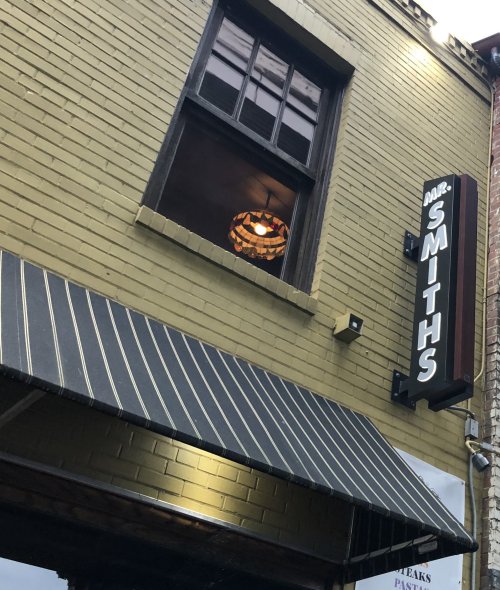
But one of his main interests continues to be the piano at Mr. Smith’s.
The bar has long been established as a popular piano venue, and Jesse simply walked through the venue’s front doors and asked whether they needed another pianist on staff. They said yes, and ever since he’s been tickling the ivories there.
Calling Mr. Smith’s a bar is a tad disingenuous because the space is mostly filled with tables and chairs, but it attracts both diners and drinkers alike. The dark wooden benches and low lighting give the two-level building a warm, inviting feel that makes you want to sit, relax, and enjoy a song or two.
And the food’s pretty good, too.
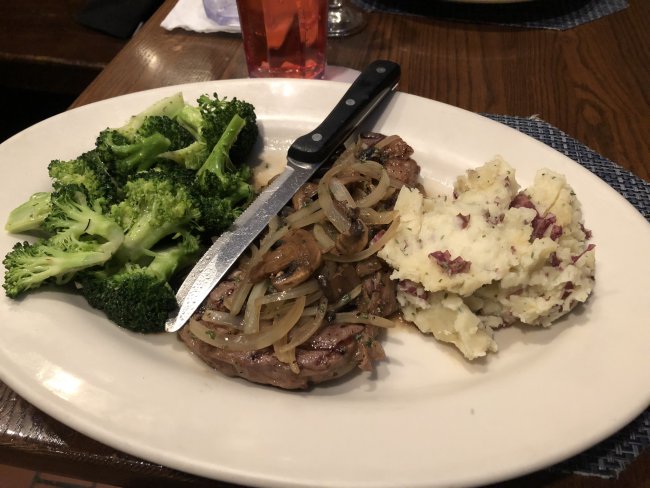
Jesse praises his choice of a 10 ounce grilled rib-eye steak topped with madeira wine and mushroom sauce, served with mashed potatoes and vegetables.
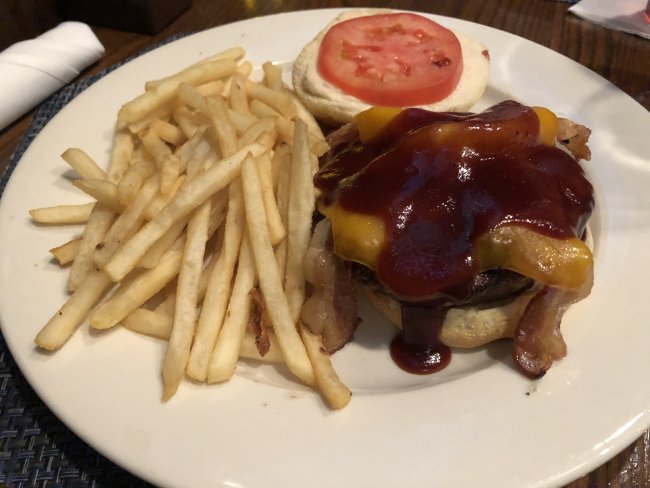
I’m enjoying the large Georgetown burger served with cheddar cheese, smoked bacon and barbecue sauce and served with a generous side of fries.
While we eat, Jesse tells me that despite his high energy on performance nights and the fact he feeds off the crowd’s energy, Friday and Saturday is all he can manage. He’s at the bar from 9am to between 1am and 2am both nights. With the average song lasting about four minutes, he can manage roughly 15 songs an hour, for about 60 a night. Around 11pm he’ll allow himself a brief break before the rest of his set.
Most of the requests are for upbeat songs, though he says occasionally someone will request a slow ballad or downbeat tune. Of course, many of the most popular songs are also some of the most overplayed, like “Piano Man” or Journey’s “Don’t Stop Believing,” among others. That’s why he hopes people study his self-made song sheets in detail, with the goal that they’ll pick something a little less unoriginal.
He’ll accept most requests, but not any songs that would get him in trouble for singing. And when it’s a rap, being a white guy he skips over any use of the n-word. He also finds it awkward when singing sexually suggestive songs about guys. But generally Jesse takes most of the requests in good humor and enjoys the audience interaction.
From the piano stool, he’s noticed some interesting quirks for requests that vary by age. If people from New York are visiting, the older ones will request Frank Sinatra’s “New York, New York,” while middle-aged people pick Billy Joel’s “New York State of Mind” and the younger crowd goes for “Empire State of Mind” by Jay-Z and Alicia Keys.
Jesse’s favorite songs to play including anything by the Beatles that is not “Hey Jude” or “Let It Be” because he lumps them in the over-requested category.
His absolute least favorite to play, even more so than “Piano Man,” is Queen’s elaborate “Bohemian Rhapsody” simply because of the intense stress it puts on his voice and the precision required — people notice if he skips even the briefest section.

It’s about 15 minutes before showtime, and Jesse and I are wrapping up the interview over Mr. Smith’s dessert special that day; a rich, tasty toasted almond cake.
I tell Jesse his gig seems like a fun way to spend two nights every week, so I wonder if there are any downsides. He struggles to think of any, but a few days after the interview emails me with one minor issue: “It happens a bunch, happened again last night, and when it did I thought of your question. That is: people clapping on the 1 and the 3, instead of the 2 and the 4. Not sure if you’re musical or if you’ll know what I’m talking about here, but in a standard rhythm with four beats per measure, people are supposed to clap on the second and fourth beats. That makes it sound more fun and upbeat. Whenever people clap on the first and third beats instead, it’s the worst.”
But largely he has nothing but praise for his time at Mr. Smith’s and looks forward to it continuing. “Instead of spending money on Friday and Saturday nights, I’m here making money,” he says. “But it’s not about the money, that’s a secondary consideration.”
So what is it about? Another smile. “It’s about making people happy, and that is what makes it worth doing,” he says. “You give happiness. It’s just a joy.”
I stay to watch Jesse play several songs, enjoying his natural ease from behind the piano and his interactions with the happy customers in the bar. Pretty soon his request list is filling up, spanning a number of genres with some pleasantly original choices. No wonder the place is packed many weekends, his enthusiasm playing and singing easily carries to everyone else in the bar.
Eventually it’s nearing my bedtime, so I say goodbye to Jesse and head out of the bar.
As I leave, I realize that he didn’t play “Piano Man” once.
o1h3qf